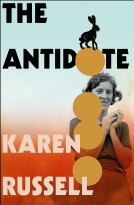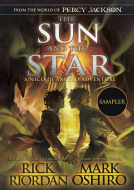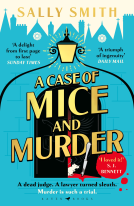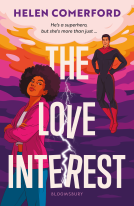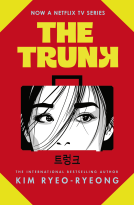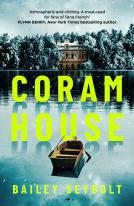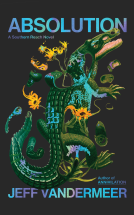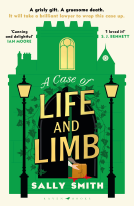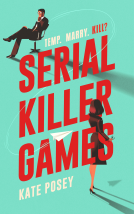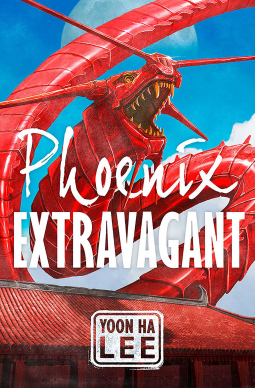
Phoenix Extravagant
by Yoon Ha Lee
This title was previously available on NetGalley and is now archived.
Send NetGalley books directly to your Kindle or Kindle app
1
To read on a Kindle or Kindle app, please add kindle@netgalley.com as an approved email address to receive files in your Amazon account. Click here for step-by-step instructions.
2
Also find your Kindle email address within your Amazon account, and enter it here.
Pub Date 20 Oct 2020 | Archive Date 30 Sep 2020
Rebellion | Solaris
Talking about this book? Use #PhoenixExtravagant #NetGalley. More hashtag tips!
Description
Gyen Jebi isn’t a fighter or a subversive. They just want to paint.
One day they’re jobless and desperate; the next, Jebi finds themself recruited by the Ministry of Armor to paint the mystical sigils that animate the occupying government’s automaton soldiers.
But when Jebi discovers the depths of the Razanei government’s horrifying crimes—and the awful source of the magical pigments they use—they find they can no longer stay out of politics.
What they can do is steal Arazi, the ministry’s mighty dragon automaton, and find a way to fight…
A Note From the Publisher
This title will now be released in October 2020.
Advance Praise
"Powerful. Unforgettable. Another amazing piece of work." - Stephen Baxter
“A fiercely original and enchanting new fantasy” - Adrian Tchaikovsky
“A smart, thought-provoking book, and one which feels incredibly timely.” - SciFi Now
"An arresting tale of loyalty, identity, and the power of art... Lee's masterful storytelling is sure to wow." - Publishers Weekly Starred Review
"A story of art, love, human connection, the power of creation, colonialism, and the roles we all have to play in fighting oppression." - Paul Weimer
"Phoenix Extravagant is a book containing ruminations on imperialism, the function and sanctity of art, acculturation, and the morality of love. It also contains a bloody big and unexpectedly adorable mechanical dragon." - Jonathan L. Howard, author of the Johannes Cabal books
"A powerful, deeply moving book that is a wonderful read, without question one of the best of the year." - Every Book a Doorway
Available Editions
| EDITION | Other Format |
| ISBN | 9781781087947 |
| PRICE | US$24.99 (USD) |
| PAGES | 416 |
Featured Reviews
Yoon Ha Lee has done it once again. It is tempting to compare Phoenix Extravagant to his other prominent work, Machineries of the Empire, which is easily one of my all time favorite science fiction series. In some ways the comparisons are unavoidable, but I did my best to view Phoenix Extravagant as it’s own independent work. And it does stand on its own, quite magnificently. While it doesn’t necessarily carry the same breadth of world-building and action as Lee’s other works, it nonetheless packs a punch in ways that are smaller, subtler, but equally compelling. Lee remains a master of creating relatable and fascinating characters; from Jebi themselves, to Vei, Bongsunga, and even the metal dragon Arazi. The strength of interpersonal relationships amid the complex plot, a keystone of what I admire about Lee’s work, shines in this novel.
Additionally, Phoenix Extravagant struck me as a compelling parable about war, as well as the atrocities of colonization and imperialism, both overt and subtle. While the horror of war and the terrible lengths people will go to justify their actions on both sides was prominent, the subtler tragedies of imperialism felt to me the most impactful—Jebi’s name change and the strife it caused between them and their sister, offhand comments made by side characters about changing cultural norms, the systematic destruction of art for the purpose of war, the looming presence of “the west” though the westerners themselves were mostly a sight unseen. I also found the story a very significant comment on the colonial theft of art through imperialism. As a White American I am obviously not able to directly relate to much of this commentary, but it does allow me to think long and hard about the dark imperialist past of my nation and culture, and the ways (in my opinion) that we are still complicit in the hoarding of cultural artifacts that are not our own—but I digress.
The one thing that bothered me, besides my desire to see more lush worldbuilding, was that sometimes I felt like there was too much going on. While I enjoyed the mention of more explicitly fantastical elements—Fox spirits, the celestials living in the sky—they did feel a little bit out of place with the rest of the story. So much else about the magic of the world, e.g. the masks, the glyphs, the pigment making process— was gone over in such intensive detail that it felt a little bit strange to have these other magical elements included without equivalent background or explanation.
Still, I was inspired and delighted by Phoenix Extravagant, and strongly hope that Lee continues this story in the future.
 Reviewer 243531
Reviewer 243531
I have to say I’m predisposed to like Phoenix Extravagant because Machineries of the Empire is one of my favourite series.
This is something new again, a gorgeous novel filled with complex and diverse characters set in a fantasy version Korea Hwaguk occupied by the Japanese – called Razanei. Jebi, the non-binary protagonist, Vei [redacted because spoilers] plus a wider cast including mecha dragons and fox spirits.
It would be easy to see this as easier than his previous series because the worldbuilding is more familiar; an analogue to worlds we recognise, unlike the more alien, numeric Hexarchate. But I found great depth in the constant colonial references, from Jebi’s initial obliviousness to the pain of their name change, to their complicity in engaging with the Razanei. Everything is considered; the cultural differences between art, food, even magic were explored with a subtle touch.
I was hooked from the beginning; I wanted to hold up every page and press it against other people’s faces and say ‘read it! look how good it is!’ There’s a strong balance between the lighter moments and the horrific consequences of the ongoing story. I don’t want to say too much, I’d hate to spoil anything for a novel this good.
Plus, who could resist this cover?
As a massive fan of Yoon Ha Lee's previous series (the wonderful space opera series that starts with Ninefox Gambit), I was an easy sell for a fantasy book from the same author, especially that rarest of animals the standalone novel. While I can't say I'm an equal fan of the cover art chosen for the book, its contents were enough on their own to sell me completely.
Phoenix Extravagant is set in a world where automata have been introduced for some roles, such as policing the local populace of the occupied territory of Hwamal, now a subject state of the neighbouring country of Razanei. Jebi just wants to get a secure job, one which will allow them to use their talents for art, but their background is something of a handicap even though they try to hide it by taking on a Razanei name. This causes conflict between Jebi and their sister, still mourning the death of her wife during the invasion, who becomes even more incensed when Jebi takes on a job with the Ministry of Armor.
In an extension of the automata, the Ministry has used their technology to create automata for use in warfare and wants to use Jebi's knowledge and skills to understand just what went wrong with the one they currently have locked in the basement. Jebi is horrified to discover the source of the automaton's self-awareness and, alongside their growing relationship with the Ministry's chief duellist, finds themself becoming Hwamal's most unlikely revolutionary.
I really enjoyed Phoenix Extravagant, which has a plethora of interesting world-building elements and the author's customary sly humour. Jebi as a protagonist has a one-track mind without being two-dimensional and their relationship with their sister in particular feels very genuine. If I have any complaints, it might be about the speed with which Jebi and Vei's relationship appears, seemingly created out of very little, but that's a minor quibble in an otherwise excellent book.
I received a copy of this book from the publisher and Netgalley in exchange for an honest review.
A MASSIVE thank you to Rebellion Publishing and Netgalley for providing me with my first ever ARC in exchange for an honest review!
Phoenix Extravagant is a beautiful and at times brutal story about the struggle to remain true to our values in the face of adversity.
Jebi is a Hwagugin artist, and somewhat of a pacifist, struggling to make a living in a country recently incorporated into the Empire of Razan. When Razanei racism threatens Jebi’s livelihood, they accept a job in the Ministry of Armor, using their artistic skills to harness the mysterious magic that gives life to the automata. Jebi is soon pulled into government plots and forced to confront the reality of the Razanei colonisation.
Readers of fantasy who get excited about discovering new magic systems will enjoy this book as much as I did. Lee has some fantastic and original ideas, but what I really enjoyed was how he incorporates magic into the story. He intertwines it with myth, history and art to frame the moral struggle of the main characters to remain true to themselves, their heritage and their family.
For this book Lee chooses a non-binary protagonist and a society where sexual orientation is inconsequential. This can sometimes feel like token representation, and more recently a sort of worldbuilding genre trope, but I feel that Lee is subtly drawing focus away from gender to his chosen societal themes, and I think its effective.
I’m hard pressed to think of an infallible (human) character in this book, however Lee is unbiased in his storytelling and each character feels relatable. I was fascinated by Jebi’s relationship with their sister Bonsunga throughout the story. We’re told more than once that Jebi believes art is about the inner nature of things, and it feels like Lee is studying the inner values of humans from various perspectives with this ensemble.
I loved Lee’s writing and thought this was a beautiful, nuanced story. I cannot WAIT to have a physical copy so I can stare at that stunning cover. I have high hopes that Rebellion will release a line of merch that includes a matching bedspread.
 Alexander G, Reviewer
Alexander G, Reviewer
I love Yoon Ha lee! Loved his SF books, and this fantasy offering is just as good. The main character is an artist, who discovers that his art has magical abilities and uses it against the invaders. Very good prose, nice characters and as always with this author, the conflict is not just black and white.
 Hannah K, Reviewer
Hannah K, Reviewer
Simon and Schuster was kind enough to pass along an ARC of this. I honestly wasn’t expecting how quickly I tore through this, even with shelter in place in effect here. The pitch is that an artist is “recruited” into collaborating with an occupying government and working on the sigils that animate the government’s secret automata weapon, and the deeper they go, the more they find out about the occupying government’s crimes, and the less they can stay out of politics. So they decide to steal the automata they’re working on. Yeah, it’s a heist book, but it’s also about siblings, and the role of art, and the various ways people choose to survive, and also mechs that become self aware, and war crimes, and identity. This seems like it’s going to be a one shot, but I would love to see more of these characters. Also - enby main and romance! This comes out in June, and I highly recommend picking it up when it does.
I want to open this review up by telling you what not to expect from this book. Because I know from the experience of not really getting Yoon Ha Lee’s writing style in Ninefox Gambit, how people might not like this one, his first fantasy novel. (And because I know a lot of people have come to this off the back of his middle grade novel, which is great, but also very different to his adult style, but enough dithering.)
Things not to expect:
An action-packed ride (at least not til closer to the end).
Very much exposition on the world-building (particularly magic systems here). He’ll trust you to pick it up as you go along, and that does/doesn’t work for different people.
A light writing style (in that it’s quite detailed and dense at times).
Okay, now we’ve got that out the way, why should you read this book?
Firstly, I am biased, because I read Machineries of Empire and loved it (barring the aforementioned blip of getting into the first book). So, I knew I would like this book at the very least.
The best thing about this novel is Arazi. I mean, who wouldn’t love a snarky sentient automaton dragon? And really, the book gets very good once Arazi shows up. The relationship between him and Jebi was a little reminiscent of Jedao and Cheris in book 1 of Machineries of Empire so of course I was guaranteed to like it.
And then there’s the worldbuilding. I know I warned about the dense writing an lack of exposition above, but for me those are great aspects of it. I love being trusted by the author to pick up magic and politics as I go along, because I’m really not one for reading long passages explaining the world.
There were probably two things I was less enamoured by. The first is that Jebi is a much more passive (for want of a better word) character than Yoon Ha Lee’s previous mains. I don’t necessarily think that’s a bad thing, but for a lot of the plot they just seemed to go along with things, rather than causing them. But hey! They just want to live in peace, really, so I can see them as a more reluctant rebel type. I also didn’t love the romance, but again, that’s just me. The whole relationship was necessary to the plot, but I didn’t think the romance itself was (if that makes sense).
But overall, this was an enjoyable read. And one I urge you to take up, especially if you want to read more of Yoon Ha Lee, but adult sci fi is too intimidating right now.
 Librarian 250745
Librarian 250745
Fantastic, diverse and engrossing fantasy with a strong core message about war. Brilliant characterisation and beautiful if rather sparse world building. Highly recommend.
Wow. I finished this book just a few minutes ago, and I’m reeling. In the best way! But I’m not at all sure how to describe what I just experienced.
First off, Phoenix Extravagant took me completely by surprise; it was not the book I was expecting. I was incredibly excited when I heard that Lee was writing a fantasy novel, because the creativity demonstrated in his sci-fi is incredible, even though I bounced off those books (I’m not much of a sci-fi reader, and they are pretty heavy sci-fi). So, thinks I, now he’s writing fantasy I have a much better chance of being able to properly appreciate him! Because fantasy is my genre, even when it gets properly weird. This one, I’ll be able to read and be wow-ed by!
And I did! I was! This was much easier to sink into than Ninefox Gambit, and I enjoyed it immensely. But I was expecting the wild, outside-the-box, wildly-inventive creativity of Ninefox, and that’s not what this book is. Or no, that’s not right; it’s that Ninefox is immediately and obviously out there. You can’t miss the fact that it’s like nothing else you’ve ever read, because the alien strangeness is in your face from the first paragraph.
Phoenix Extravagant is also like nothing else I’ve ever read, but in a much subtler way. Superficially, the world and story of PE is fairly recognisable, even standard; the setting is obviously inspired by eastern Asia, and the magic system takes the form of a series of glyphs painted in special inks – it’s very reminiscent of computer code. A few small but delightful details stand out – one of the minor characters is a gumiho, the Korean equivalent of a kitsune, a shapeshifting fox-spirit, and her presence in society is completely normalised, a conceit that delighted me; as did the presence of the Celestials living on the moon, visible going about their lives through telescopes. But for the most part, neither the worldbuilding nor magic system are what makes this story special.
I hardly have the words to explain what it is that makes PE such a heavy hitter. I mean that literally; I don’t know what to call the primary movers and shakers of the story. Cultural forces, maybe? Phoenix Extravagant is like an ocean that is calm on the surface, but has deep and powerful currents running just beneath what’s visible. It’s about the give and take of different cultures, of shifting cultures, of cultural values and those things that are valuable to a culture (not always the same things). It’s about appropriation and assimilation, patriotism versus practicality, conquerors against the conquered. Those are the things powering the plot, driving the story and the characters within it. Those are the things that sweep you up and drag you in and keep you up late at night, turning pages as quickly as you can.
On the surface, this is a story about Jebi, a non-binary/third-gender artist of Hwaguk, a country that was conquered by the Empire of Razan six years before the book opens. Unlike their older sister, Jebi is, if not quite indifferent to Hwaguk’s vassalage, more or less at peace with it: this is the world they live in now, and they mean to succeed in it as best they can. That means paying the substantial fee to register themselves with a Razanei name – Tesserao Tsennan – and applying for a job in the now Razanei-run Ministry of Art, both things their sister Bongsunga would view as betraying their people, and unforgivable. Which is fair enough, given that Bongsunga’s wife died in the war, but Jebi knows that working with/for the Razanei is the only way they’re ever going to be able to support themself, instead of living on Bongsunga’s charity forever.
Through a tricky little knot of events and behind-the-scenes subterfuge, Jebi ends up working for the Ministry of Armor instead of the Ministry of Art, their artistic skills put to use in the creation of Razan’s magically-powered automata – which police the streets – instead of in propaganda posters or the like. And as the book’s blurb states, Jebi discovers the horrible secret behind the creation of the inks the Razanei use to create those automata…
But, see, it’s not the horrible secret you’re probably guessing it is. It’s arguably worse. And I can’t talk about it without giving too big a spoiler, but it’s that unexpected twist that sets the tone for the entire book, the linchpin of the whole story. And I’m so impressed with it, and the way it’s woven through the book, how all those cultural forces I mentioned tangle and twine with each chapter.
This book wasn’t what I expected. I seriously doubt it’s what anyone is expecting, given the blurb it was given, which isn’t lying but is definitely misleading – or possibly lying by omission. But for the best of reasons. If the blurb explained what’s actually going on in PE, it would sound so dull to most readers, and it isn’t. I don’t know that I could spin it in a way that makes it exciting either, but Lee has written it all in a way that’s un-put-downable – not because it’s non-stop action and fight scenes, but because he’s an incredible writer who makes even the slower, quiet moments resound with the reader.
Oh, and there’s a dragon. An utterly fabulous dragon. But I’m willing to bet it’s not the kind of dragon – or character – you’re already expecting it is.
It’s not Pacific Rim. It’s not an anime. But it’s a powerful, deeply moving book that is a wonderful read, without question one of the best of the year. I can’t wait until it’s out so I can talk to other people about it properly!
 Reviewer 432127
Reviewer 432127
Anyone who's read my blog will know that I'm a huge fan of Yoon Ha Lee's work. From the Machineries of the Empire trilogy to his short story collections, I've read and loved them all. As such, when I saw word that a new book was being written, I knew I had to get my hands on it as soon as possible. Ironically, I was telling myself I wouldn't request any more titles until I cleared my backlog, but I just couldn't resist. And I was certainly not let down. A huge thanks to Rebellion/Solaris for approving this title on NetGalley for me, despite requesting it so late in the review cycle.
From the first chapter, it's clear that this world is heavily inspired by the Japanese (the Razanei) occupation of Korea (the Hwaguk) in the 20th century. A major theme in this book is colonialism. Namely, this book hits two major points, the first being the response of the colonized people. Through different characters, Lee shows responses ranging from open resistance (Bongsunga), reluctant integration (Jebi), to open assimilation (Hak). Pheonix Extravagent also explores the behavior of the colonizers and the discrimination faced by the Hwaguk. As the summary implies, much of this commentary is done through the lens of art, in the perceived value of art styles from different nationalities, art theft, and art destruction.
For fans of the Machineries of the Empire trilogy, the worldbuilding and the magic system will seem the most familiar. The Razanei rely heavily on their automata, automated machines that can obey basic commands, tireless and un-swayed by human emotion. These automata are brought to life by special pigments, made from the destroyed works of dead Hwaguk artists, are used to form glyphs that command the automata. From having read some of Lee's short stories, this is a concept Lee's explored before. However, Phoenix Extravagant has really expanded that concept with the horrifying background of the pigments and made it truly fascinating to read.
Of the characters, Jebi, our non-binary, pacifist, "I just want to paint" artist was my favorite. From their introduction, it's clear that Jebi just wants to paint, and if it has to be for the Razanei government and he has to adopt a Razanei name, so be it. Unfortunately for Jebi, making a living as an artist is difficult and instead of working as a typical salaried artist, they get dragged into a secret military project, the dragon automata Arazi. Naturally, having met Arazi and realizing this dragon is sapient, they hatch a plan to break him out. One of my favorite aspects about Jebi it's very obvious they have no idea what they're doing. Every plan, every action, is tinged with a sense of 'oh fuck I hope this works' and 'holy shit that worked?'. Lee captures the extremely erratic behavior of artists extremely well, from the 2AM bouts of inspiration to the hours upon hours of staring at a blank sheet of paper. There are some hilarious scenes where Jebi uses this to convince the Ministry guards to let them into places 'because artist things, y'know?'. And the Ministry guards, apparently used to this behavior, just rolls with it. Jebi embodies peak Chaotic Dumbass Energy and I love them.
Aside from Jebi, there are Vei, the Ministry of Armor's Duelist prime, Jebi's project manager and later lover, Bongsunga, Jebi's older sister, and Arazi, the dragon automata. I enjoyed Vei's character as the rational one of the pairing. Jebi's unabashed pining for her was extremely cute to read. However, as the two of them got closer, I felt like there was a lack of chemistry. I think this is largely due to a lack of Vei ever really showing affection for Jebi beyond dialogue. Bongsunga took longer to warm up to and early on I just thought she was a hardass. However, we get more of her backstory and her activities in the second half of the book and I found myself appreciating her pragmatism and dedication to her people, even if it meant going beyond her personal stakes. Arazi, was, as expected, extremely lovable. Arazi comes off as a young sheltered, though mature child, constantly asking Jebi to explain sensations that he cannot experience. And also he's a dragon. What more can a reader want?
Besides the lack of chemistry, one minor point I had issue with was the more fantastical elements. For a book so mired in practicality, the more fantasy elements like the Celestials just chilling out on the Moon or the Razenai trying to build something to travel to the moon seemed almost out of place.
Overall, I rate this book a 4/5. Yoon Ha Lee brings together a stark and fascinating world inspired by the Japanese occupation of Korea in the 20th century. The characters, Jebi, Vei, Bongsunga, and Arazi are all extremely lovable, though I had issues with Jebi and Vei's chemistry. I will have to say, that ending was, uh, unexpected.
Review to be posted on my blog at a later time
 Steph Z, Bookseller
Steph Z, Bookseller
Based on Korean history and art, Phoenix Extravagant offers beautiful perspectives on art, revolution, love, and survival. Hwagugin artist Jebi just wants to paint, a goal that is hard to achieve for Hwagugin while the Razanei rule their land. Jebi obtains a Razanei name and takes the artist exam, an endeavor that puts them in the path of armies, revolutionaries, and a pacifist dragon. Intense, enjoyable, and leaves you with a burning desire to read the sequel.
I enjoyed this fantasy novel a lot, and it is interesting because it compares well to a recent book I read which had Eastern mythological underpinnings. When reviewing that, I was uneasy about what felt like a relatively generic take on a certain kind of martial arts, Chinese mythology whilst the central storyline was very much still vision quest stuff. So why did I respond to Phoenix Extravagant more? I think at the heart of it there is a specificity to the world-building, there is one tiny tell that this is more Korean than anything else, but once that slot into place there was a solid analogy for the novels world. Add to that a flawed, pacifist lead trying to get by in an occupied state (watching someone agonise over compromises is far more interesting than just being a paragon of resistance) and a solid central magical idea and I devoured it.
This is even when the book contains a central issue whose lack of resolution leaves me with a degree of unease. The central magical idea in the book is that the occupying forces have automata to fight and to maintain order in the cities - which are basically golems or robots animated by masks with particular glyphs painted on them. The mixture of the characters and the (somewhat horrifically devised) magic paint animates them. This is the job our hero finds themselves in, to try and solve a problem with an automata in the form of a dragon. And in the process we hit upon what I think of as the Angel Problem - basically what happens when you realise that your mindless or evil monster that you are indiscriminately killing turns out to have the potential to have a soul/not be evil. About of a third of the way through the book that becomes an issue here and is never really resolved. Luckily the lead characters' pacifism makes it way less of an issue, but it feels like loose end when we get to the stock in trade battles in the last third.
Much of that is by-the-by, what impresses here is that mixture of tight, innovative, new to me worldbuilding and interpersonal struggles. I'm always going to be a sucker for a book where the protagonist is an artist, but there are deeper questions about representative art versus symbolic art, along with those of love, duty and honour. To then tuck that in with an enemy who is not evil, and potentially even part justified (as the big reveal near the end suggests) also plays into it well. It works perfectly well as a standalone, though the ending is open enough to suggest where it might go (and as said above there are plenty of unanswered questions and places it can go).
Reviewed as a NetGalley ARC
 Reviewer 230978
Reviewer 230978
Phoenix Extravagant by Yoon Ha Lee- A dream of a book, mostly fantasy but with science fiction elements as well. Gyen Jebi has always wanted to be an artist, a painter in their Asian-like country in some future or past beyond our time. Their country is currently occupied by a military force from a neighboring land that rules with a harsh hand. Jebi is maneuvered by forces unknown into the Ministry of Armor, and tasked with painting the face-plates on a large metal dragon with paints that possess magical powers to give the war machine directions and restrictions. Of course, Jebi has other ideas. They gift the dragon with a separate set of thought, awareness, and speech. And that's just for starters! This book was a real pleasure to read as everything I've read from Yoon Ha Lee has been. I felt that even though the main character is in their late twenty's, their naivety and sheltered upbringing made this more of a young adult novel- nothing wrong with that. There are deaths and a suggestion of sex, but it felt like YA to me. I know there will be more to come with this story and I'm looking forward to it. Thanks to Netgalley for giving me this ARC.
 Tyler D, Reviewer
Tyler D, Reviewer
Phoenix Extravagant by Yoon Ha Lee is a fantasy set in a world going through internal struggle and insurrection, where automatons are used - usually as guards, but there is also a dragon automaton built for war. Gyen Jebi (a non-binary artist) finds themself seconded to the Ministry of Armor to help paint the magic infused masks used on automatons to drive behaviour and intelligence.
It's told in the third person and exclusively follows Jebi, as they win a rapport with the dragon and Vei, the Ministry of Armor's Duelist prime. Even through there is no detailed explanation as to how some things work, the descriptions of the different pigments (Phoenix Extravagant being one of the rare and potent ones) and processes used to mix and paint glyphs and sigils to drive automatons behavior is intriguing and very readable.
So is the relationships between Vei and Jebi, their sister Bongsunga and the dragon Arazi, as Jebi struggles with the results of some their decisions and where their allegiances lie. It's also funny at times, poking fun at artists and their sometimes eccentric behaviour, and Jebi's sometimes not-so bright decisions.
One issue I did find however was that by using "they", "their" etc. to Jebi being non-binary, often reading passages I had to double take at times to make sure who was being referred to. Even for instance is the first line in my third paragraph above - "their sister Bongsunga" - is she Jebi and Vei's sister, or just Jebi's? Things like this happened quite a lot and while it wasn't a major issue, it was a bit distracting especially at the start. I also thought if Jebi was a she or he it would have made little difference overall; gender really didn't impact the story at all, but it may have made it a bit more readable.
Anyway apart from that digression Phoenix Extravagant was quite an impressive, well-paced and original story - and has a great cover.
 Reviewer 418715
Reviewer 418715
Just look at his cover - magnificent, isn’t? Dragons are cool, but automatic dragons are something else.
Phoenix Extravagant, set in a fantasy version of Korea during the Japanese occupation, revolves around politics, war, and rebellion. Instead of showing the conflict through the eyes of devious politicians or fighters, it follows Gyen Jebi, a non-binary painter destined (or rather maneuvered) to shift the scales of the conflict. A delightful change from the smash and bang seen often in occupation narratives. Gyen wants to paint, and they care little about politics or war.
The Empire of Razan conquered Hwaguk and transformed it into Administrative Territory Fourteen. Gyen’s sister, Bongsunga, has revolutionary ties. She feels betrayed when her sibling registers for Razanei name, hoping it’ll allow them to secure a job. Jebi accepts an offer from the Razan government’s defense sector. His job involves reducing classic Hwagugin artworks to magical pigments necessary to program the behaviors of automata used to control the populace. A neat magical system. Without getting into details, Gyen ends up teaming up with a mecha dragon against the government.
The world, while inspired by history, is extravagant, atmospheric, and mysterious. The book tackles the theme of colonialism and various forms of response from colonized nations (resistance, acceptation, partial assimilation). As mentioned before, politics happen in the background but influence Jebi’s life to the point where they can’t remain impartial. The choices they face and erratic actions they make pulled me through the novel.
While they unravel the mysteries surrounding recent massacre, they grow involved with the lives of a sizable cast of characters, including Arazi - a sentient mecha dragon. Gyen’s actions are never thought-out. They react on impulse and often finish in even bigger troubles.
Lee does a fine job breathing life into each of the protagonists, imbuing them with hidden depths that slowly reveal over the course of the book. That said, Gyen’s relationship with Vei felt slightly forced. I didn’t feel any chemistry between them. In contrast, Gyen and Arazi banter made me regularly smile.
Even though I liked the book, it has a few downsides. First, it’s somewhat predictable. Second, the climax of the book moves at jet speed but it doesn’t resolve all conflicts, and I would expect a stronger closure from a book marketed as a standalone.
Despite its stumbles, Phoenix Extravagant was well worth the time spent reading it. It’s fun and entertaining. I wouldn’t mind seeing more entries in this well-crafted world. The open (sort of) ending gives hope Arazi will return. Fingers crossed.
 Kes Y, Reviewer
Kes Y, Reviewer
Review will go live on website & Instagram on May 26th
Will update feedback with instagram link on that date
Review is already up on Goodreads
__________
Gyen Jebi isn’t a fighter or a subversive. They just want to paint.
This tagline from the synopsis really drew me into Phoenix Extravagant and I love how consistent this premise remains throughout the entire story.
Jebi is an unemployed artist who is looking for work and ends up being recruited by the Ministry of Armor. This is not the job that Jebi had hoped for themself, but they are unable to refuse. Within the Ministry of Armor, Jebi paints sigils onto the automatons to bring them to life. But as their work continues, Jebi starts to notice that something suspicious is happening. With the help of a charismatic dragon automaton, Jebi is thrown into the world of politics and rebellion despite their hesitation.
This was a really fun and interesting read for me. I had just finished reading a series of very dark and violent fantasy novels, so Phoenix Extravagant was a nice break from that. I loved Yoon Ha Lee’s take on colonialism and war through the perspective of an artist. Phoenix Extravagant seems to pull from the Japanese occupation of Korea. I really enjoyed this take on an “asian-inspired” fantasy. It was a unique and engaging perspective. A lot of asian-inspired fantasy as written by white folks draws on stereotypes, particular periods (so much Japanese feudalism), or vague handwaving, so it was great to read an asian-inspired fantasy novel written by a Korean-American.
I really liked Jebi as a character. I loved how they were unaware or had very basic knowledge of a lot of political happenings. It felt realistic within the frame of the character. Jebi is an ordinary person. Jebi is extremely focused on their art, so when they fall into a situation that puts them in the middle of a lot of politicking, they are completely out of their depth.It was refreshing to follow a character who didn’t know exactly what was going on or why. Sometimes protagonists are too competent in too many different areas.
I loved how Jebi didn’t always make the best choice, how sometimes their stubbornness was misplaced, and how sometimes they were irrationally paranoid. All these factors contributed to making Jebi feel like an ordinary, if eccentric, person. Jebi is also a very empathetic character, so I really loved how they became involved in the world of politics and rebellion by connecting emotionally with the automaton dragon Arazi.
And of course, one of my favourite parts was that the book is set in a very queer friendly world. There were queer marriages, non-binary folks, and polyamory. And I loved how certain things like haircuts were codified to show that a character likely had a certain identity. It reflected my experience in the lgbtq+ community. When Jebi gives another non-binary character the little nod of acknowledgement I pointed at the line and exclaimed to my wife “look! It’s the gay nod!”
Overall, I really enjoyed Phoenix Extravagant. Yes, there were some aspects I didn’t love and the ending left me torn, but it was still a really enjoyable read with interesting world building and a driving plot.
Phoenix Extravagant is a fascinating book, filled to the brim with worldbuilding and trope-breaking fantasy wonder. The characters feel real, motivated by inner desires and goals. The world expands slowly, as Yoon Ha Lee allows the reader to glimpse more and more of the scenario he's created. The ending threw me a little; I'm not sure what is real and what is fantasy, which could be said of the story as a whole. Definitely a book worth reading.
This was absolutely wonderful.
Having read the Machineries of Empire, which I describe as a New Weird space opera, I was expecting the same kind of mind twisting here. Don't get me wrong, I *like* New Weird, so I wouldn't have been upset, but I was nevertheless surprised by how easy to read this was.
This book is set in a thinly disguised secondary world version of Korea, occupied by a thinly disguised secondary world Japanese Empire. The protagonist is Jebi, a not-Korean artist just trying to get buy. They've learned not-Japanese and adopted not-Japanese mannerisms and even taken a not-Japanese name, to make it easier to get work. (Non-gendered pronoun use is deliberate: Jebi is non-binary, which their culture is fine with and the not-Japanese occupiers are just kinda baffled by.) All of this infuriates their sister, who's late wife died fighting the not-Japanese invasion.
Jebi hears of a job offer from the not-Japanese Ministry of Armor, responsible for producing weapons, armor, and, most importantly, the magically powered soldier and tank automata constructs that made the conquest of not-Korea so easy. They're offered a job painting the magical glyphs that make these constructs work ("offered" in the sense of "the secret police know where your sister lives" kind of offer). Once they've accepted this kind offer, they find out what their assignment is: the Ministry is having trouble with the automata dragon they've constructed, and it's Jebi's job to find the problems in the controlling glyphs and correct them.
Now, automata are made to be mindless, mute golems, executing their instructions perfectly. But while working on fixing the dragon's glyphs, he secretly adds the glyphs that will give the dragon a voice.
What follows is a truly wonderful story of many different kinds of love. The love of Jebi for art, the love between Jebi and their sister, the inconvenient love that Jebi develops for a high-ranking Ministry member, and what might possibly be my favorite love between person and dragon outside of Hiccup and Toothless.
But this isn't a light-hearted book by any means. Colonialism is a heavy theme, and cultural erasure. Yoon Ha Lee managed to upset me in a way that no book has really ever been able to, when Jebi learns the secret behind the pigment used to make the glyphs. Yoon, if you happen to read this, that was seriously upsetting. Loyalties are tested all over the place, and the line between good guys and bad guys gets more than a little blurry in places.
One thing this is *not* is a book about trans rights. Jebi's non-binary gender identity is simply an accepted part of who they are. No struggles for acceptance. This is neither a feature or a bug: stories about that kind of struggle are important, but stories showing non-binary as a normal and accepted part of society are valuable as well.
I'm not sure if this book will have a sequel or not. It doesn't need one: the story ends on a perfect note as far as I'm concerned, but Yoon left themselves room for one. I kind of hope there isn't a sequel, honestly. This book was wonderful all on its own.
I loved Phoenix Extravagent. The story didn’t go at all like I expected it to, but it’s still well foreshadowed and all of the characters had great motivation for their actions. I didn’t really know anything about the Korean-Japanese war before I read this book, but I finished the book and ended up reading more about it because of how well written this book was. Readersnwho know more about the historical setting of this book should still enjoy Phoenix Extravagent; possibly even more with a greater grounding in the setting.
This book was emotionally complex, but somehow remained light. The themes running through it of cultural genocide, racial divides, the morality of war, what makes us human and the value of art are undoubtedly heavy ones; but Jebi and Arazi were such joyful characters that the book never felt weighed down by its heavy content matter. To me, Phoenix Extravagant is exactly what science fiction and fantasy should be: using outlandish elements to explore real-world issues in an in-depth way that, without the softening effects of magic or futuristic touches, would be tragic, dry or politically fraught.
The plot of Phoenix Extravagent was fast moving and fascinating, and I loved the intricate world-building touches woven into the dialogue and scene descriptions that helped the setting and magic/political system of the world come fully to life. There was no cliff hanger in this book, though there was a threat presented at the last moment that makes me think a sequel to Phoenix Extravagant could in the works—something I would be extremely happy about.
The representation in this book was another high point. I think this is the only book I’ve read with multiple non-binary characters. Sexual minorities were also represented well, even a happy polygamous marriage was included—something I believe I’ve only seen previously in GL Carriger’s San Andreas Shifters series. The casual representation (plot points don’t revolve around any character’s identity, nor is anyone’s gender/sexuality discovered or revealed during the course of the novel) was greatly appreciated.
Jebi was a great main character, and I loved that their calling to art flavoured the way they experienced and described the world. Arazi was a hilarious and touching character, and Vei was an amazing grounding force for them both. The multiple family relationships were also incredibly written. Bongsunga and Jebi’s interactions were thoroughly believable, and Vei’s parents are incredible characters in their own right—I truly hope there are more books so they can get some more time to be explored. I’d also love to learn more about Jia in any hypothetical future books.
The artists and the community they lived in was a fascinating set-up, and the mythological interpretation of the moon was charming. Automatons as a way to explore sentience and morality is always amazing, and I loved the idea of a calligraphy-based magic. This book is unique and amazing, and any fans of richly detailed fantasy and Yoon Ha Lee’s previous work will find something they enjoy in Phoenix Extravagant. I believe the book would also appeal to fans of Ilona Andrews’ Kate Daniels series, Ian Irvine’s Well of Echoes quartet, Samantha Shannon’s Priory of the Orange Tree, or RF Kuang’s Poppy War.
 Sharon A, Bookseller
Sharon A, Bookseller
Jebi wants to paint and produce art and is willing, however reluctantly, to assimilate into the new regime they change their name and apply to the Ministry of Art. What Jebi does not realise is that they have come to the attention of the military arm of the regime and the Ministry of Armor offers them a position painting the masks that control and power their automata who patrol the streets keeping the peace.
Jebi is selfish and naive in the way they interact with their new world order. They do not consider the consequences of their action other than how their sister is going to react. It is not until they are working for the Ministry that they are exposed to the terror of those consequences. In order to protect their sister and lover they make choices which bring about violence and death whilst also doing something noble.
Phoenix Extravagant is about the aftermath of conquest, the privilege and power of the conqueror and the extremes those in power are willing to go to versus the subjugation of the natives, their culture and freedom. Also the subversion of the power of art to produce something that can be grotesque or beautiful depending on the intentions of the individual.
Yoon Ha Lee has produced a finely balanced story with some vividly described scenes and well paced and choreographed action scenes.
This book surprised me. I wished for it as it was coming in my Goldsboro SFF subscription and I wasn’t sure I would enjoy it. Therefore I wanted to read it first in order to know what to do with it.
I am extremely happy to say that I loved it. It was such an interesting and rich narrative not what I was expecting at all.
I was easily drawn in by Jebi and found myself ploughing through the pages to find out what would happen.
I have to say the dragon was amazing by far my favourite character - incredibly well written and insightful.
Overall this is an extremely good book and if you were considering giving it a try do so. Hopefully you too will be pleasantly surprised with what you find.
 Mack P, Reviewer
Mack P, Reviewer
5/5 Stars. This is a strong contender for my favourite novel of the year.
Phoenix Extravagant is an amazing fantasy novel with a unique magic system that will blow you away, and a land and lore inspired by Korean history that is simultaneously amazing and a big kick in the face for the old association of fantasy = vaguely European Middle Ages.
Yoon Ha Lee combines his cultural background with some really great casual representation and diversity: the main character is genderqueer, and same sex and poly couples are also featured. The writing is casually diverse, a mention of signed languages or colour blindness - no preachy forced diversity some people have criticised in media - and instead a natural understanding that people are different.
Gyen Jebi is a great protagonist because they are very complex and very different from what I have seen in other media. They are an artist, not a fighter, and never magically learn to be, and they do not turn out to be the Chosen One. They have complex motivations and opinions and neither fall into a "maybe colonialism is okay" nor a "I will singlehandedly ignite a revolution that is one hundred percent good and all casualties are for the greater good" mindset.
 Christopher M, Reviewer
Christopher M, Reviewer
Phoenix Extravagant is, well, it’s good. Actually, strike that. It’s great. It’s a story which wants to get you thinking about big questions - about colonialism, about identity, about family, about the nature of choice. But it’s not a weighty treatise. The story artfully weaves all of these big questions into more personal narratives, into the lives and loves and struggles of the characters, creating something which sparkles on the page, which compels you to turn just one more page, and, above all, is a delight to read.
As you can tell from the above, I rather enjoyed this one. One of the core reasons for that is the protagonist, Jyen Gebi. Jyen Gebi isn’t a Chosen One, or a general, or a powerful politician. Jyen Gebi is an artist. Jyen Gebi is just getting by, as much as they can, as well as they can, under difficult circumstances. They’re easy to sympathise with, just wanting to get on, do their job, do it well, and pay the rent. There’s a vulnerability and an honesty there, a sense of an everyday person just trying to get by. Jyen Gebi is thoughtful, introspective, someone trying to break free of the socio-economic constraints fitted around them; or at least, wanting to make those constraints chafe a little less. And they’re genuine - warm, and funny, and friendly. Not romantic per se, but willing to build relationships, to put the work in. Someone who knows what the right thing is, and will at least try to see it through.
It helps (perhaps) that we can contrast Jyen Gebi with their older sister: fierce, driven, uncompromising, she is. A wonderful contrast to Jyen’s capacity for accommodation of circumstance. Because that passion is dangerous, It can lead you into all sorts of trouble, especially in the world these two inhabit.
They’re not alone in that world, of course, being surrounded by a supporting cast that includes ominous government ministers, well-connected art dealers, elegant duelists and, well, a dragon. The latter I don’t want to discuss in too much detail, for fear of spoilers, but watching them adjust to the world, experience it fresh, deciding who and what they are and will be, is wonderful and each turn of the page is downright refreshing.
All of these folks are living in a world whose story seeps out of the page over time. It begins in a city under occupation, where cultural heritage and memory are being appropriated or expunged. Where the people - not the aristocracy, but the regular run of people - are adjusting to their new state of being, to their new leadership, and where the new leadership are trying to shape the people in line with their own cultural mores, their own truths. And that city, with its undercurrents of racial and cultural tension, its overt military control, its revolutionaries and collaborators...that city is simmering and may yet boil over. I must admit, walking the neighbourhoods with Jyen Gebi is a joy, seeing them thrive and live and absorb their new cultural overlords, or rage at their arrival. At the blockhouse of the ministry of armour, or the lavish rooms of a dealer in fine art. This is a pcle which you can see in your minds eye, feel, smell even. The words that draw this into being construct a work of art that you build out yourself, and have a sense of place, a sense of reality to them as a result. The city lives.
The plot. Look, I won’t spoil it for you, but it’s intriguing, it’s thoughtful, it will make you think, and it’s fun. There’s romance, charmingly structured and passionately compelling. There’s swordfights. There’s highwire tension, friendship, betrayal, joy and terror in equal measure. This is a story which made me gasp, which made me laugh, which wrung out my heart and, above all, a story which made me feel. It’s a fantastic story, one I deeply enjoyed, and one which you’ll enjoy as well.
I received an ARC of this book in exchange for a review, which is why my review is being posted before the (coronavirus-delayed) release date.
Non-spoiler review first, since this is coming so early: the short version is, you should absolutely be excited for this book. It's a sharp turn in many ways from Yoon Ha Lee's previous work--there are no space battles, little math or technical language, and characters don't spend much time sharing each other's bodies or experiences. What it does retain are carefully crafted images, an unflinching look at the pain and human toll of war, and clever use of the physical world to ground emotional and metaphysical ideas. Once again, Yoon Ha Lee immerses us in a world where magic is not just a fact of the world, it's an emotional reflection of the way it works--painting literally captures the way we see and shape the world. Even if you thought Machineries of Empire wasn't for you, this book is worth a second look--and if you did, then I probably don't need to convince you.
Spoilers follow! Don't read ahead unless you want to know, in great detail, what happens and to whom.
Unlike with the (pro? an?)tagonist of Machineries of Empire, the infamous Shuos Jedao, Jebi is more accessible to those around him and to the reader. Our connection to them comes not from others' experiences with them, but with their own experience in the world. This experience is what makes their painting such a powerful device for capturing the effect of the occupation; Jebi's art provides an embodiment of their relationship with the occupation and their struggles over what is worth memorializing. As a big fan of the "elegant duelist" character, the presence of Vei was a great chance to see a more refined, classical version of combat, and also--through her duel--a well-used opportunity to subvert it. By making all of the novel's central characters approach the occupation from distinct angles, Yoon Ha Lee is able to show us how it is made of people, people with ideas and beliefs about how to do good in the world despite their frequently untenable positions. He refuses to take the easy way out and cast cackling villains or draw equivalences between Bongsunga's willingness to render Razanei art and Hanfanden's careless disregard for Jebi's culture. Instead, the ending provides a literal "zoom out" moment that leaves us with the idea that perhaps we are all much much smaller players on the world stage than we believe, even when the corner of it that we do inhabit is overwhelmingly vast. Vei's duel and Jebi's earthquake stand out as crisp, poignant scenes, and Hak the gumiho is a beautifully written minor character whom I would have loved to see more of. It's these little moments and the plot that carries them forward that make this book worth anyone's while.
Having read Lee's Ninefox Gambit, I knew that I should expect a few things from Phoenix Extravagant: an incredibly immersive and original world, great characters, and a compelling read. While I enjoyed Ninefox Gambit, his latest novel absolutely blows it out of the water for me.
Lee manages to strike a fantastic balance between darker themes and lightness and humor that makes this book a fast-paced and incredibly fun read. While witty banter, unexpectedly sweet characters, and plenty of fun makes Phoenix Extravagant an incredibly compelling and quick read, he does not shy away from the horrors of colonialism. Exploring identity, cultural erasure, and the damages of colonialism. It's a hard-hitting narrative that is easily absorbed by the reader.
WIth amazing characters that twist your expectations as a fantasy reader, to wonderful worldbuilding and an impactful story, Phoenix Extravagant is one of my favourite books of the year so far. It feels so wonderfully fresh in a genre that can sometimes be a little stale (despite it being my favourite).
4.5 out of 5 stars
First up: if you’re expecting unique sci-fi like Yoon Ha Lee’s brilliant The Machineries of Empire series, this is not it. It’s not sci-fi at all, but historical fantasy that is perfect for the fans of R. F. Kuang’s The Poppy War series. However, even if you’re a diehard sci-fi fan, I recommend you give this book a chance. If for nothing else, to see how an author can pull off such a different genre and writing style so brilliantly. I received a free review copy from NetGalley in exchange for an honest review.
Phoenix Extravagant is set in a country that resembles turn of the twentieth-century Korea; mostly sticking to its traditions, but with cars and electric light. It has been invaded a decade earlier by a country with different but similar traditions (i.e. Japan) and has since settled into an uneasy relationship with the conqueror that consist of conforming and rebelling.
Gyen Jebi is the sole point of view character. They are an artist and they only want to paint, even if it means working for the invaders. They are ready to conform in other ways too; they have learned the invaders’ language and officially changed their name to fit in better—a decision that causes a break-up with their sister. But when it turns out that what they paint directly helps the enemy to not only oppress their people but to destroy the country’s cultural heritage too, they start having second thoughts. Their journey from an observer to an active agent is fairly fast, but the outcome isn’t entirely what they expected.
Jebi is an interesting character. They don’t identify as a man or a woman but as not gendered. No attention is drawn to this, apart from the pronoun ‘they’ with which Jebi is referred to. There are other people like Jebi and people recognise them for what they are without them having to ever mention it. It doesn’t cause them any grief, nor is it something they have to think about. The author doesn’t tease readers with hints of what they may have started as and there is no explanation given to why such choice was made—or if it was a choice at all. I would’ve liked to know if this stems from actual Korean tradition or if it’s something the author created for this book, but all in all, it worked well, even if it was an unnecessary detail in the character’s development and how the story played out.
The world-building is great. The traditional Korean culture comes alive in small details that are treated as natural facets of Jebi’s life without unnecessary explanations—though they are explained better than the alien cultures in the Machines of the Empire series, making it easier to understand. The fantasy elements are fairly light and woven into the narrative so seamlessly that the reader doesn’t necessarily even notice them. There are automatons, mechanical humanoids that are given life with magic. There is a huge dragon automaton too, the key to the story, as Jebi is tasked with creating the correct magical sentence structure that would operate it. In the end, Jebi learns this magic so well that they become instrumental in a rebellion against the invader. And the poetic ending brings home for good that we’re not dealing with reality after all.
The pace of the narrative is fairly fast. Since this a stand-alone novel and not the first in trilogy, it takes no time at all before Jebi finds themself trying to rebel against the invaders. The story is easy to follow—again, much unlike the Machines of the Empire—and interesting. There’s drama and tragedy, but good and sweet moments too. All in all, it’s excellent historical fantasy.
 Imogene H, Bookseller
Imogene H, Bookseller
There is something quite extraordinary about a book that not only entertains and educates, but also sends you diving into Wikipedia because of how much more you want to know about it. Set in a brilliant fantasy, semi-steampunk Korea during its occupation, Phoenix Extravagant manages to weave together so many different themes that one can almost become dizzy. The power of art, of personhood, colonisation and the struggle of occupation, Magic, and the big question: can a magical, mechanical dragon pass the Turing Test?
Added to this are fully realised, layered LGBT characters. Lee himself is a member of the LGBT community, and his characters, non-binary, trans, pan, bi, are some of the best written queer characters that I have met recently. There is no being shoved to the side, no being fridged. The protagonist Jebi is completely themself throughout. I want to adopt them, and feed them, and help them make good life choices!
5 stars. 5 glorious stars, and an extra one for Lee’s Catten who makes regular appearances of the authors social media.
 Laurel B, Librarian
Laurel B, Librarian
4.5 stars.
Dragons. Art. Revolution.
Jebi isn't a revolutionary. They're an artist, and they just want to paint, dammit. So when they're turned away from the painting exams, thrown out of their house after their sister finds out their adoption of another man, and they get an offer from the Ministry of Armor to paint—they take it. Granted, they have little choice, but they take it.
"If standing on principle means that you lose the people those principles are meant to protect, what's the point?"
I. Loved. This.
YES. Me, a non-arty for arty's sake person loved this book about an Artist, capital A.
This was a beautiful piece of anti-colonialist fantasy that I was so happy to read!
Jebi is a painter who creates art for the sake of art. That is their life's blood and their passion, and they have been grateful for their elder sister, who has supported them in their pursuit. However, in a colonized country that is still occupied by the invaders, finding a paying job that allows the pursuit of art is...really difficult, particularly if you are not one of the colonizers. So Jebi changes their name (because what's in a name?) to a colonizer's name, and that change is the last betrayal their sister will accept.
Anyway, I loved this way more than I was expecting to love it, because 1) it surprised me and 2) it was funny as fuck. I wasn't expecting it to be funny.
Vei's mouth quirked at the corners. "Can you think of anything likely to be faster than a dragon this size? Especially since Arazi assures me that it can fly."
{I can definitely fly,} Arazi said with disturbing confidence.
{Have you ever tried it?}
{I'm a dragon. I can fly.}
There were marks of humor that had me howling more than was probably appropriate, because parts of this hit that sweet spot of absurdist humor that I love.
And there were higher points, like the destruction of art for literal power/magic, and what it means to destroy art to turn it into something else, and what it means to value art only as the means to an end instead of an end in and of itself. And what becomes good art, or art that is valued. Jebi's people's art was sought out for its destruction and ability to power mechanicals and the colonizer's army of things, while the colonizer's art was valued as the pinnacle of society.
Within this discussion of what is art lay another point: at what point does the mimicry of the thing become the thing itself? And do the origins matter?
In this world, dragons existed (or had existed). However, Arazi was an imitation of the thing but had become the thing. It was art that had been imbued with a sense of purpose and self, to the point where it believed it was a real dragon, so it was a real dragon. Period.
Vei lifted one shoulder, let it fall. "It's your choice, she said, resigned. "I will keep the hostiles from touching you. I will cut down anyone who so much as stirs a hair on your head."
Jebi was torn between saying You are embarrassing me and I am going to take up my brush and make a painting of you that they will talk about for the next 10,000 years. They said neither.
I also loved the relationships in this book.
There's Vei, a singular duelist and swordswoman. Upright, honorable, dedicated to a fault. Yet, she's also got an interesting past, with a high-ranking father in the colonizing army, and two other parents who were part of the colonized. She was seen as both conqueror and traitor, to the point where her identity took up sort of a cognitive dissonance of two separate and opposing things. And her relationship with Jebi really needed stronger communication skills, but they got better at it (also, how much can you truthfully communicate when both of you are under suspicion and in the enemy's stronghold). And, of course, Vei's really not so sterling past (with a it was war and what happens in war is not personal attitude).
There are Vei's parents, who had little page time but were wonderful.
There's Jebi's sister, who's name I cannot remember, who had layers of her own and surprising depths, most of which sprang from her grief at the loss of her wife. Her tale was one that catapulted her into action after suffering from the loss of a loved one, whereas Vei was catapulted into action to prevent the loss of a loved one, which was interesting to see how the two women were used as foils in Jebi's life.
There is also Jebi's friend, who's name I cannot remember, who showed Jebi kindness while also betraying her own people in order to gain a scrape of power and fashionable lifestyle in a world where she would ordinarily have been afforded neither.
There is a duality there that's explored throughout many of the characters in the book—where you show one person one aspect of yourself, and another something else entirely, to the point where there are so many pieces that are you and not you, depending on who is looking at you. Like a painting, or art, in many regards.
And of course there is Arazi, the dragon who was just so fucking precious and amazing and initially scary as fuck, which just goes to show that what is not understood is frightening, and it takes the knowing and understanding to make it less frightening (in some regards...in other regards, as also shown in the book, more knowing and understanding makes things more frightening).
Anywho, after this long and garbled review where I have written (as usual) long blahblahs about things that have no fucking point and make no fucking sense, let me just say that I loved this book and I also loved the world-building, where everything fit perfectly together and was just so beautiful and so well done and did I mention that it was funny? Particularly because much of the subject matter was so grim and the implications so dire.
Also, it's queer as hell!
I received this ARC from NetGalley for an honest review.
I loved Lee’s Ninefox Gambit and Raven Stratagem, so I dove into Phoenix Extravagant in the hopes it would be just as good. I was wrong – it’s better! In a fantasy Korea-like land, newly conquered by fantasy-Japan, a young artist, Jebi, ekes out a living selling conventional mass-appeal paintings. An orphan, they live with their sister in an uneasy relationship. Okay, I was hooked. First, my own sister is an artist and I love the protagonist being a gifted painter longing to do original work instead of copying others. Second, how cool is it to have a nonbinary primary character in a world in which this is no big deal???
Back to the story: Jebi’s plan to better their (and their sister’s) conditions is to pass the exam for the Academy of Art. Much to their dismay, they aren’t admitted even though their work is perfect. They are subsequently recruited/drafted by the Ministry of Armor, the propaganda arm of the fantasy-Japan occupiers. Who have been extracting magical pigments from priceless original fantasy-Korean art (which involves total demolition of the pieces). Jebi reacts with horror to the destruction of his nation’s cultural heritage. The most rare and prized of these pigments is “Phoenix Extravagant,” vital for the mystical sigils used in controlling masks for automata – including a sentient, robotic dragon destined to be a war weapon. The dragon turns out to be a pacifist at heart, in no small part due to its no-harm programming.
What happens next, with all its twists and turns, is wildly inventive, full of heart and longing and magic. I adored Jebi and the woman duelist-prime, and most of all, the dragon. I can hardly wait for Lee’s next book!
 Kay L, Reviewer
Kay L, Reviewer
This book was painfully incredible. I first found Yoon Ha Lee through his Nine Fox Gambit series (if you haven't read it, you should), and was looking forward to this book as soon as I found out it existed. Unlike the previous series, this isn't hard sci-fi; it merges automatons and magic in a fantasy world that seems to draw its inspiration from east Asian cultures. (I love non-European fantasy even if nothing else is going on!). The main character of the book, Gyen, is non-binary and uses they/them pronouns. If there's literally nothing else to say about this book, it demonstrates that you can write about sex with non-binary characters without explaining what's between their legs - and do it very, very well.
Gyen is a painter, and the story digs into the idea of paintings and art as magic that can be made physical and used to animate and direct otherwise inert mechanical creatures. The concepts are as cool as their execution. There's a strong romantic throughline to the book, though I'd stop long before calling it a romance. It does touch on some of the military resistance concepts that came up in Nine Fox Gambit and its sequels but presents them in a fresh light. It is emotionally challenging to read a book where it is very clear that people like you are the oppressors, but it's also good to be challenged.
This book appears to have an ending that is complete, so I'm not sure if sequels are planned; I'd love to read more books set in this world, however, even if they are not specifically about Gyen.
Readers who liked this book also liked:
Rick Riordan; Mark Oshiro
Children's Fiction, LGBTQIA, Teens & YA
Keith Martin; Konstantinos Mersinas; Guido Schmitz; Jassim Happa
Business, Leadership, Finance, Computers & Technology, Reference

